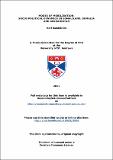Modes of mobilisation : socio-political dynamics in Somaliland, Somalia, and Afghanistan
Abstract
This thesis provides a framework for viewing socio-political contexts and how these relate to interventionist projects. The framework draws on and combines strands from international relations and sociological perspectives of social interaction. The central question becomes how intervention and existing social contexts interact to produce unintended outcomes. It applies the analysis to two separate wider contexts: Afghanistan and Somalia, with a particular focus on the self-declared independent Somaliland as an internally generated and controlled transformational process. Unlike abstract directions of theoretical development the framework seeks to provide a platform that sets aside ideological assumptions and from which interventionist projects can be observed and evaluated based on literature, field observations and interviews.
Drawing on such diverse influences as fourth generation peace and conflict studies, Morphogenetics, and social forces theory, the framework explores conditions and interest formations to capture instances of local agency that are part of a continuity of local realities. It views social interaction without imposing Universalist value assumptions, but also without resorting to relativism or raising so many caveats that it becomes impractical. It exposes the agency of local interest formations hidden beneath the discourses of ideologically framed conflicts. These social agents are often dismissed as passive victims to be brought under the influence of for example the state, but are in reality able to subvert, co-opt, constrain or facilitate the forces that are dependent on them for social influence. In the end, it is the modes of mobilisation that emerge as the most crucial factor for understanding the relevant social dynamics.
Type
Thesis, PhD Doctor of Philosophy
Rights
Creative Commons Attribution-NonCommercial-NoDerivs 3.0 Unported
http://creativecommons.org/licenses/by-nc-nd/3.0/
Embargo Date: Electronic copy restricted until 21st June 2017
Embargo Reason: Thesis restricted in accordance with University regulations
Collections
Except where otherwise noted within the work, this item's licence for re-use is described as Creative Commons Attribution-NonCommercial-NoDerivs 3.0 Unported
Items in the St Andrews Research Repository are protected by copyright, with all rights reserved, unless otherwise indicated.


